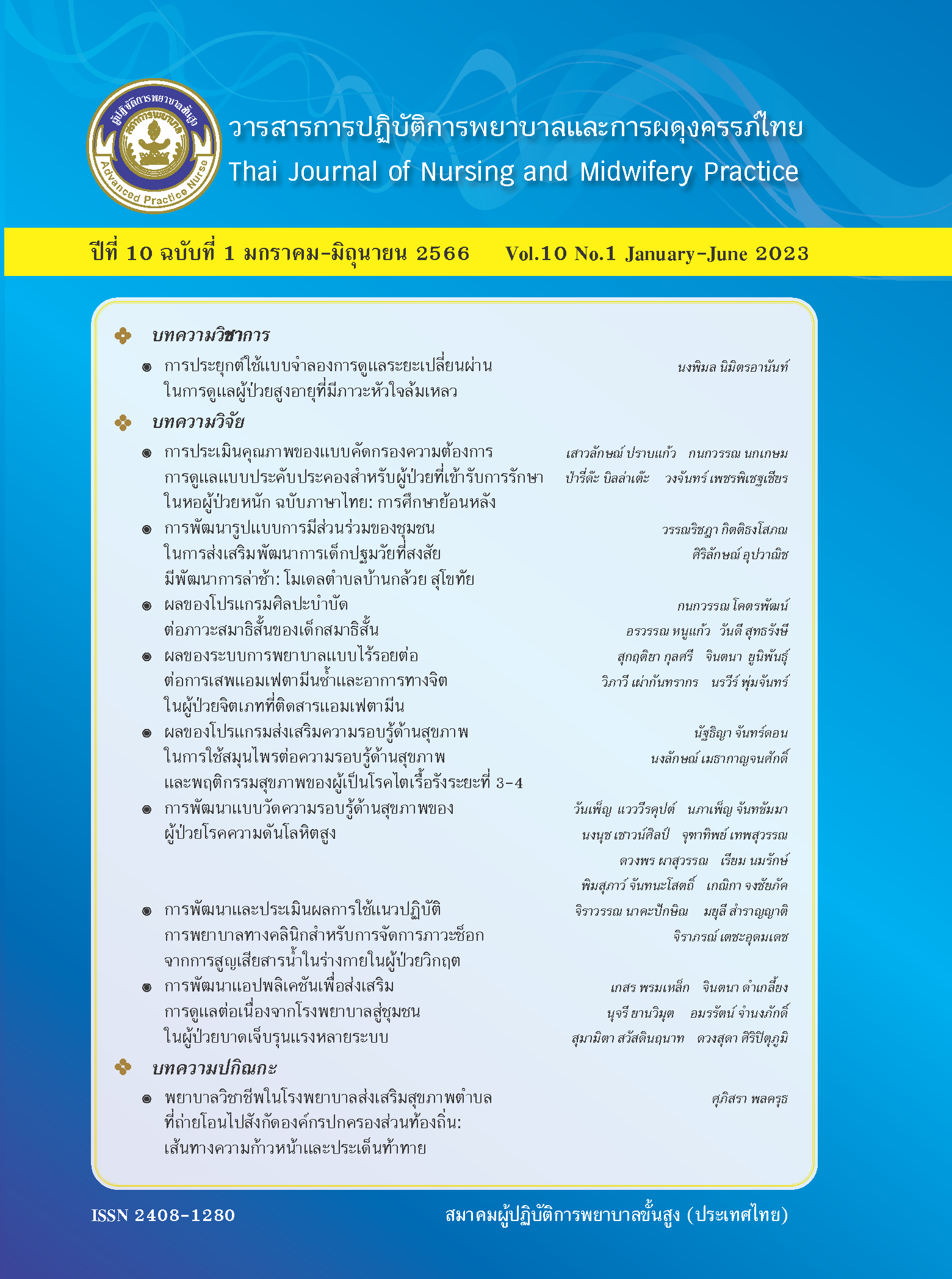Effects of a Seamless Nursing Care System on Amphetamine Relapse and Psychotic Symptoms in Schizophrenic Patients with Amphetamine Use Disorder
Main Article Content
Abstract
This experimental research with two group, pretest-posttest design, aimed to compare amphetamine relapse and psychotic symptoms in schizophrenic patients with amphetamine use disorder between experimental group receiving of a seamless nursing care system and control group receiving the routine care. The samples comprised 38 Schizophrenic patients with amphetamine use disorder, recruited from the inpatient department of Somdet Chaopraya Institute of Psychiatry. After matching characteristics of gender, sample were randomly assigned equally (n=19) to either experimental group or control group. Research instruments included the seamless nursing care system in schizophrenic patients with amphetamine use disorder comprises of 3 phases of care, 16 activities, a program of individualized relationship therapy, group supportive psychotherapy, family counseling and telephone counseling to patients for a total of 6 weeks. The amphetamine relapse and psychotic symptoms were measured by assessing the amount of use and severity of psychotic symptoms and tested for content validity reliability of the scale yielding values of .90 and .97 respectively. Data were analyzed by independent t-test. Findings revealed that the amphetamine relapse and psychotic symptoms of the experimental group after receiving the seamless nursing care system in schizophrenic patients with amphetamine use disorder were lower than before, and lower than the symptoms in the control group, at the .05 level. Therefore, it can be concluded that the seamless nursing care system in schizophrenic patients with amphetamine use disorder should be used to improve schizophrenic patients with amphetamine use disorder.
Downloads
Article Details

This work is licensed under a Creative Commons Attribution-NonCommercial-NoDerivatives 4.0 International License.
References
Campbell EC, Caroff SN, Mann SC. Co-occurring schizophrenia and substance use disorder: Epidemiology, pathogenesis, clinical manifestations, course, assessment and diagnosis. UpToDate®; 2016.
Triruangworawat B. Methamphetamine increases the psychiatric patients. [serial online] 2022 [cited 2022 June 26]. Available from: URL: https://www.mgronline.com . (In Thai)
Department of Mental Health,Thailand. Mental Health and Psychiatric Services report for Schizophrenia and Substance use disorder. [serial online] 2022 [cited 2022 February 8] Available from: URL https://www.dmh.go.th/Report/Datacenter/Dmh/Reds.Asp/(In Thai)
Somdet Chaopraya Institute of Psychiatry. Report for Schizophrenia and Substance use disorder; 2564. (In Thai)
Wittayathawornwong L,Junsirimongko B, Suriyachai A, Darakorn PA, Kornkamchairit K, Khunarak U. The Effect of The Integrated Program on Drinking Behavior and Psychotic Symptoms in Alcohol Use Disorders with Co-occurring Disorders Patients. The journal of psychiatric nursing and mental health.2016 ;30 (2) 143-154. (In Thai)
Fraser S, Hides L, Philips L, Proctor D, Lubman DI. Differentiating first episode substance induced and primary psychotic disorders with concurrent substance use in young people. Schizophr Res. 2012;136 (1–3).
Ye J, Chen TF, Paul D, McCahon R, Shankar S, Rosen A, et al. Stigma and discrimination experienced by people living with severe and persistent mental illness in assertive community treatment settings. International Journal of Social Psychiatry. 2016;62(6).
Green AI, Drake RE, Brunette MF, Noordsy DL. Treatment in Psychiatry Schizophrenia and Co Occurring Substance Use Disorder. Am J Psychiatry. 2007; 164.
Hunt GE, Siegfried N, Morley K, Brooke-Sumner C, Cleary M. Psychosocial interventions for people with both severe mental illness and substance misuse. Cochrane Database of Systematic.2019.
Crowley RA, Kirschner N. The integration of care for mental health, substance abuse, and other behavioral health conditions into primary care: Executive summary of an American college of physicians position paper. Ann Intern Med. 2015;163(4).
Chuengsatiansup K. Spirituality and health: An initial proposal to incorporate spiritual health in health impact assessment. Environ Impact Assess Rev. 2003;23(1).
March A. Consistency, continuity, and coordination - The 3Cs of seamless patient care. Commonwealth Fund. 2006.
Nuechterlein KH, Dawson ME, Ventura J, Gitlin M, Subotnik KL, Snyder KS, et al. The vulnerability/stress model of schizophrenic relapse: a longitudinal study. Acta Psychiatric Scand. 1994;89.
Hsueh M, Shannon Dorcy KK, Mitsuyama WC. Advance practice nurse led care coordination model in oncology patient care transitions. Cancer Nurs. 2015;38(4).
Shadish; Cook; Campbell. Quasi-Experimental Designs That Either Lack a Control Group or Lack Pretest Observations on the Outcome. Experimental and Quasi-Experimental Designs for Generalized Causal Inference. 2002.
Champley S. pwr: Basic Functions for Power Analysis. R package.2020.
Gray JR, Grove SK, Sutherland S. Burns N, Grove SK: The Practice of Nursing Research: Appraisal, Synthesis and Generation of Evidence. Philadelphia, PA, Saunders, 2017. Elsevier. 2017;11(3).
Sobell LC, Sobell MB. Timeline follow back. A technique for Assessing self-reported Alcohol Consumption. Measuring alcohol consumption: Psychosocial and Biological Methods. 1992.
Sinsak Suvanchot K, Somrongthong R, Phukhao D. Efficacy of Group Motivational Interviewing plus Brief Cognitive Behavior Therapy for relapse in amphetamine users with Co-occurring psychological problems at southern psychiatric hospital in Thailand. Journal of the Medical Association of Thailand. 2012;95(8):1075–80.
Overall JE, Gorham DR. The Brief Psychiatric Rating Scale. Psychol Rep. 1962;10(3).
Overholser JC. Group psychotherapy and existential concerns: An interview with Irvin Yalom. Journal of Contemporary Psychotherapy. 2005; 35.
Gottlieb JD, Mueser KT, Glynn SM. Family Therapy for Schizophrenia: Co-Occurring Psychotic and Substance Use Disorders. J Clin Psychol. 2012;68(5).
Uslu E, Buldukoglu K, Beebe LH. A telenursing practice for care of people with schizophrenia: Telephone intervention problem solving. J Psychiatr Nurs. 2019;10(2):131–6.
Trangkot U. Psychotherapy and Family Counseling. Santa Publishing. 5th ed. Bangkok: 2001. (In Thai)
Imkome EU, Yunibhand J, Chaiyawat W. A path analysis of psychotic symptoms among persons with schizophrenia using methamphetamines. Walailak J Sci Technol. 2019;16(4).


